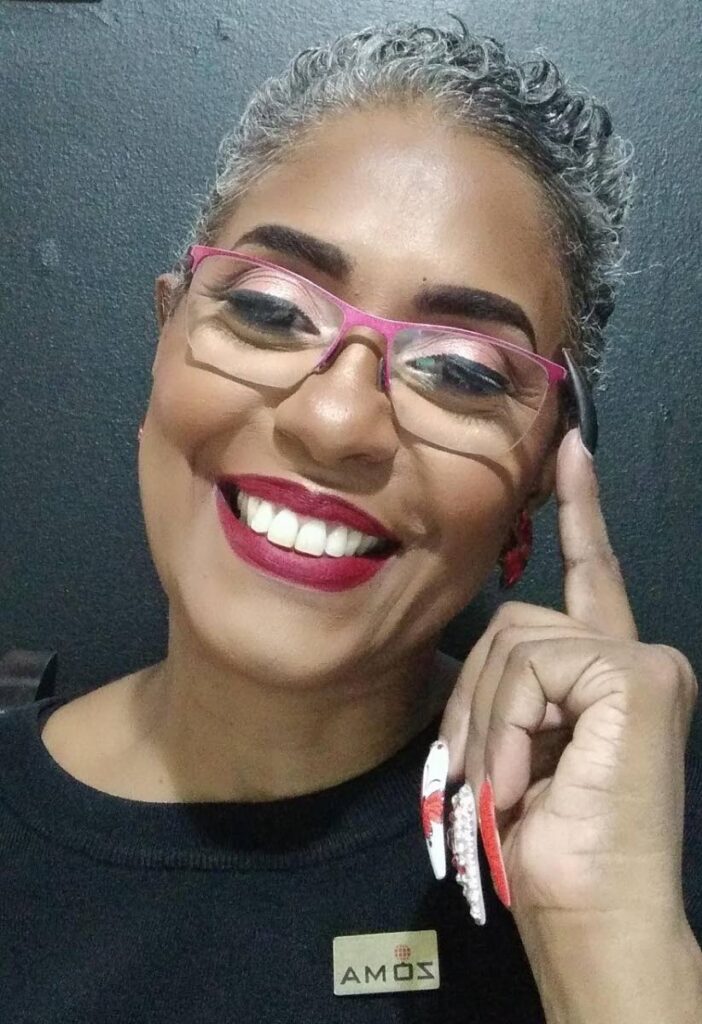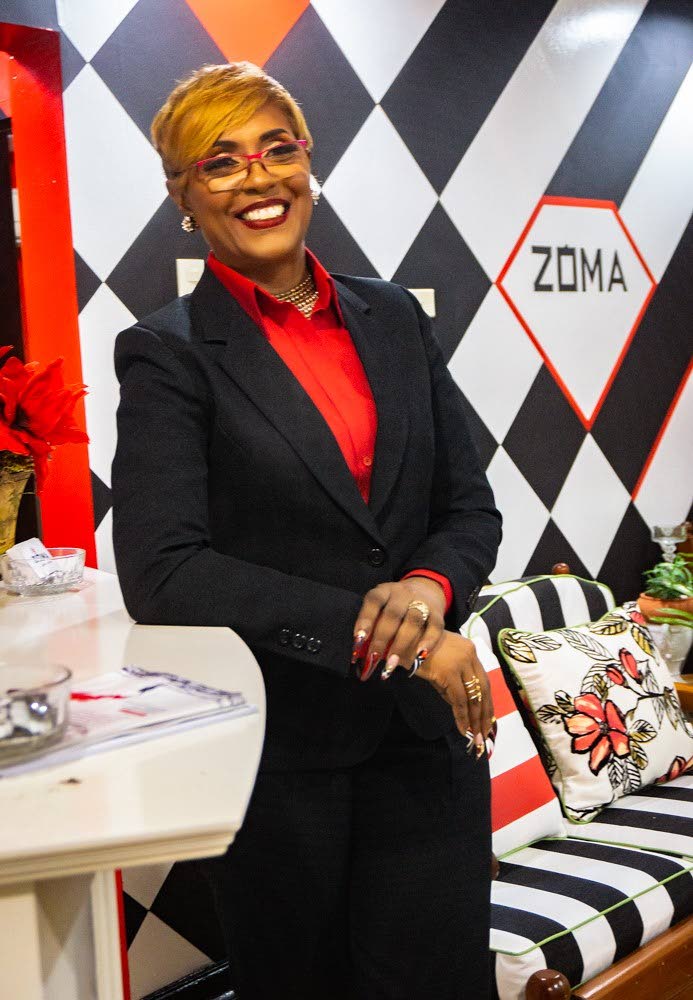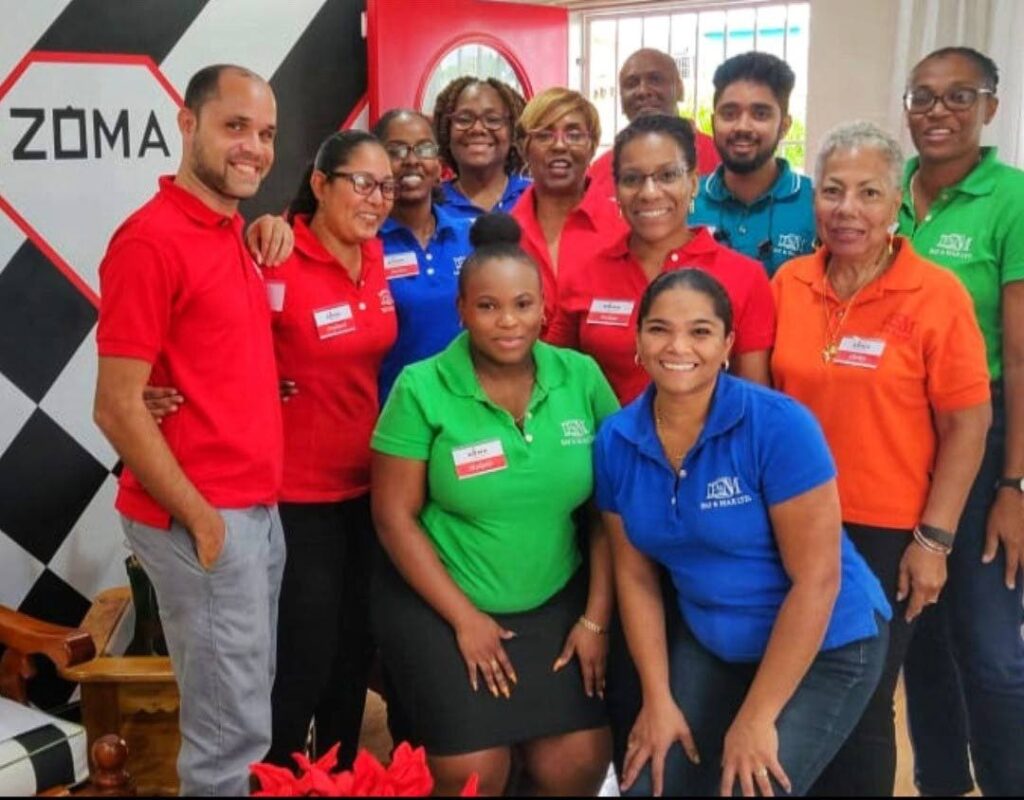Rhonda Glynn guides women along entrepreneurial road

Rhonda Glynn, 58, worked in the field of aviation for decades but she always felt like something was missing. That missing thing for Glynn was the attainment of further education.
Today, Glynn is a PhD candidate after getting her bachelors and masters degrees in her 40s.
Through her business Zoma, she is also encouraging mature women to go after their dreams. The survivor of domestic violence works mainly with female entrepreneurs.
Glynn’s business, started in 2018, offers one-on-one coaching, brand management, entrepreneur-based workshops and business planning.
She said she started doing the workshops because sometimes women may not be able afford a full business strategy. The workshops are less expensive.
Another compelling factor for Glynn’s attainment was after leaving school with just four O-level passes (now CSEC), she felt that that part of her life was unfinished.
“But in my time to go on to higher education was more about money and less about ability,” she said in a phone interview.
“So I did a couple of jobs and then I went to work in the Airports Authority of Trinidad and Tobago (AATT). I started as an estate constable.”
Her starting salary was then $1,700.
“But I always say I did not choose aviation, aviation chose me.” Over a period of time she got promoted and moved up the ranks.
During her time there, Glynn did different courses in aviation that resulted in her becoming an internationally accredited aviation instructor.
“During that period of time, I became an instructor and also a trainer. But nevertheless, I still felt as if my journey was not fully complete. It was almost as if I had industry-specific knowledge but I needed something to balance it off with.
“So when I was 40, I went back to school. It was my first opportunity to actually bite the bullet and go in the deep end.
“I remember telling someone, I did not care if I was going to learn to make toolum. This was unfinished stuff and I felt so much a failure when I only got four O-levels because it was not for the lack of ability. It was for the lack of opportunity.
“So I always felt that was always so much unfinished work.”
She took and topped every industry-specific aviation course that was offered in the region and so going back to school was the next logical next step.
“Because my background was in security I went to Cipriani Labour College where I did a certificate course...it was really to test my ability because I was moving from industry-specific to job specific. But I would also be competing with people who were not my peers,” she said.
In her first certificate course she did she got all As.

Glynn said she was shocked because she had never tested herself at that level.
“And you know there is nothing like justification for making a decision to make you run forward,” she said.
This gave her lot of encouragement, and she skipped the diploma and went straight into an associate degree in security management.
“When I was in the associate programme, I decided you know what I want to do a masters degree. I was not sure whether it was going to be criminology or aviation management. “So I called the University of the West Indies (UWI) and I was told I had to have a bachelor’s degree.
“By that time I was 43 and the nice thing about it was when the certificate was offered, the very next year, the government offered Government Assistance for Tuition Expenses (GATE) programme.”
GATE was Glynn’s opportunity and she took it without hesitation. “To be honest, I rode that train. I jumped the diploma and went into the associates…I was working shift and going to school.”
To get into the bachelors programme quickly, Glynn got as many exemptions as she could during the associate degree programme.
At the associate level, she got 13 As and six Bs and that got her into year four of the bachelors programme.
“When I was graduating from the bachelors programme, I was in the first year of the master’s programme,” she said.
She said she jumped from one degree to the next, all the while still working shift and doing aviation courses.
By that time, she was in the training department, training officers, doing instructional duties on behalf of the Airports Authority.
At 50, she had three degrees including her masters in aviation management and her bachelors in security management.
She subsequently worked at the Office of the Prime Minister as a research analyst on the Integrated Threat Assessment Team, took a year off of studying and then was accepted into the doctoral programme, where she is now completing a Doctorate in Business Administration at Arthur Lok Jack Global School of Business, Mount Hope.
“So between 40 and 50 I did all of that,” she said.
For Glynn, the most important key to success is mindset.
She said she made a decision that where she started was where she was not going to end up.
She also decided that if she failed a course she would simply do it again.

Glynn said many women are more afraid of success than of failure. “Because of that a lot of women over-think, out-think, doubt them and literally start telling them that they can’t…Anything you tell your brain, it becomes a reality.
So it is important for people to have people to tell them that it is alright to be uncertain, to be afraid, but it is not okay not to do it,” she said.
To older women who might doubt themselves, Glynn said it is never too late to become the person one should have been all along.
“I tell people I knew who I wanted to be when I was eight years old. It took me 50 years to become that person.
“When you are weighed down by other people’s expectations you become somebody else.”
She said instead of asking themselves why, many older women should instead ask themselves why not.
She said getting older is a privilege denied to many and the pandemic told people that.
“You are older but you are not dead,” she said.
She said society plays a very dangerous role especially for older women.
“Older women do not see themselves represented in the media at all. They feel almost as if they are invisible. And if somebody tells you something often enough it becomes your reality.”
But Glynn sees the face of entrepreneurship changing and that face is now the 55-plus older woman.
“The pandemic has created what many have referred to as the great resignation. Many women are walking out of the so-called corporate world and becoming entrepreneurs for the first time in their lives.”
A 2021 usatoday.com article said a 2018 survey published by Score, a mentor network for small businesses, found women 65 and older were more likely to do so because they lost a job or need more income.
It said more than 28 per cent of those surveyed said they became entrepreneurs because they had to.
Glynn said many women were living in a time that their mothers, grandmothers and great-grandmothers did not think would come, “that women would have a certain amount of autonomy over the decisions they made in their lives.”
She said when she returned to school some of her peers said, “What she playing? She ain’t realise the bus leave she?”
“In order to build something you have to let go of many things that you thought were important. I built Zoma basically because having worked in a global environment; I felt that the gap that existed was mainly in women becoming business people.”
She said women are becoming the CEOs that their mothers hoped they would marry.
Glynn started the business in May 2018 while still employed. She decided then that she wanted to work mainly with female entrepreneurs and start-up companies.
She took early retirement in August 2021 and now works full-time in her business.
TT is fast-becoming an entrepreneurial society, she said.
She said the advantage of being a late-stage entrepreneur is that there is nothing to beat experiential knowledge (based on experience or observation), “so having lived experience means that you bring so much more to the table than somebody who is just starting out with basic qualifications,” she said.
She those kinds of people are already competitors and simply need to develop a business strategy.
“There is a difference between hustling and entrepreneurship. Entrepreneurship has become a sexy term that people take as hustling. You need a strategy in business. It saves time, it saves energy and it saves threat.”
She said when she was 27 and in a domestic violent situation she had wished there was a woman who would come to her and say this was just a chapter in her life and she would survive it.
No one came to help her and so she became that woman.
“Women make decisions based on economic factors because they feel that they don’t have money. They don’t know how to generate income and they don’t know how to build legacy. I help women to do that.
“I help them to build legacies that they can pass on to their daughters.”

Comments
"Rhonda Glynn guides women along entrepreneurial road"